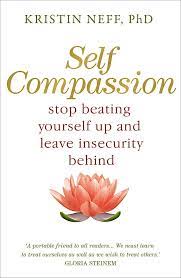Self-compassion
23.7.21
Ten or twenty years ago one of the main buzz phrases in psychology and self-help was ‘raising self-esteem’. That’s still an important topic for many people, but a different take on this subject is the idea of ‘self-compassion’.
Psychologist Kathryn Neff explores this topic in her book Self Compassion*. This is a great guide to how we can become more loving towards ourselves.
I know that for some people that may sound rather airy fairy or self-indulgent. But in my experience when we can truly love and accept ourselves our relationships with others also benefit - we become happier and more loving partners/children/parents/work colleagues/friends.
And it’s important to note that becoming more compassionate towards ourselves doe not mean letting ourselves behave exactly how we like without regard to others. Rather, it means that when we mess up or behave in ways that our out of line with our values we don’t beat ourselves up. Instead we accept that we are imperfect, we try to forgive ourselves and, in some cases, make amends to other people affected by our behaviour.
The three components of self-compassion are:
- Self-kindness
This means gradually develng a more supportive, warm way of talking to ourselves when we are in pain. Rather than judging ourselves harshly, we consciously practice talking to ourselves to in a kind way, as we might with a good friend who is going through a hard time.
- Common humanity
This is recognising that all humans suffer in one way or another, that our own pain is not unique. Our tendency when we are suffering is to feel isolated and sometimes shameful. We may even wallow in our unworthiness. Recognising our shared humanity with others can help us see our pain in perspective.
- Mindfulness
Mindfulness allows us to recognise that what we are experiencing in this moment is exactly that - what we are experiencing in this moment. If we are angry or sad, we can allow those feelings to be present without fuelling them with our thoughts. Mindfulness enables us to bring present-moment awareness to what is happening.
Neff argues that mindfulness in itself is not always enough to deal with ‘negative’ feelings and that sometimes we can get caught in depressed and anxious mind-states. In these situations we need to actively soothe ourselves by being kind to ourselves and acknowledging our connectedness with others.
But it is not about trying to rid ourselves of uncomfortable feelings. This kind of suppression of feelings can end up making them more powerful. It is, rather, about treating these feelings and experiences with compassion. That can allow us, at a deeper level, to relax and the difficult feelings will lift in their own time.
*Neff, Kathryn (2011), Self Compassion, Hodder & Storton, London



